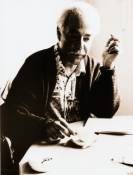|
|
Jusuf
Naoum
Jusuf Naoum’s latest novel, Nura, deals with relationships between Germans and foreigners, in this case the Lebanese. Nura leaves Lebanon for Germany, the land of her dreams, to become a nurse. Here she meets Semra. They become good friends because they share the same heritage and philosophies, and both came to Germany to escape the male-dominated society in Lebanon. But both soon find that “Europäische Männer sind nicht anders als arabische. Allerdings, die Methodik der Unterdrückung variiert.” In a conversation after Nura and her German husband, Manfred, break up, Nura tells Semra that she will be visiting Elena in Crete. “Nicht weit von Elenas Haus entspringt eine Quelle. Sie wird in einer felsigen Ausbuchtung aufgefangen und bildet ein natürliches Bassin. Das Wasser ist herrlich klar und sehr kalt. Dort werde ich übermorgen früh ein Bad nehmen.” (108) Semra tells Nura to be careful. “Pass bloss auf, dass dich nicht der Schlag trifft.” (108) Ironically, the spring is supposed to help Nura recuperate and rejuvenate. But instead it causes her death. Nura dies of a heart attack, or as Semra puts it, of a broken heart. (114) Semra collapses at the funeral in a nervous breakdown. She voluntarily spends six months in a psychiatric clinic in Hamburg, and can only be healed by writing down all her thoughts, fears, dreams. She finally decides that it is time to leave, and heads for Crete where Nura spent the last days of her life before she came home to Germany. In Crete, Semra finds peace of mind. She also feels the longing for her lost home land: “Auf der Kataro-Hochebene hatte ich es deutlich gespürt – das Heimweh, das Nura hatte. Gewiss empfand sie dort genau wie ich.” (173) Semra wonders whether Nura would have died if she stayed back in Crete and didn’t return to Germany. The last words of Semra in the book capture the forlornness and rootlessness of Nura and Semra: “Nura, wo bist du? In welchem Hafen liegt dein Schiff? Hast du den Ort deiner Sehnsucht gefunden und deinen Anker tief in die tintenblauen Gewässer von seinen Gestaden geworfen? Wo bist du? Schwebst du als Staubkorn am Firmament und wanderst von Stern zu Stern? Oder hast du dich in eine Kornblume, einsam leuchtend auf einem Feld, verwandelt?“ (174) Semra uses writing against a cold world, a world she does not know and cannot understand. Writing in the “Fremde gegen die Fremde.” Writing “um nicht wahnsinning zu werden?” Semra was on the edge of going insane. However, writing her own story saved her from going insane or committing suicide. Jusuf Naoum indicates that storytelling, but also writing can be used as a therapy, a healing. Books • Der
rote Hahn. Erzählungen des Fischers Sidaoui (Olivenverlag
1979, Luchterhand 1989) |
|||||||



 He
was born in 1941 in El Mina/Tripoli in Lebanon. He came to
Munich in 1964. He studied the hotel trade and catering and
worked in hotels and restaurants in Berlin and Munich. He then
studied physiotherapy, water therapy and massage and became
masseur, lifeguard and physiotherapist. Then he discovered
his love and talent for literature. He devoted himself to writing
in 1984 when he was 43 years old. In the fall 1994 issue of
the German Quarterly, Iman Khalil published a very interesting
article on Jusuf Naoum’s German short stories on the
Lebanese civil war.
He
was born in 1941 in El Mina/Tripoli in Lebanon. He came to
Munich in 1964. He studied the hotel trade and catering and
worked in hotels and restaurants in Berlin and Munich. He then
studied physiotherapy, water therapy and massage and became
masseur, lifeguard and physiotherapist. Then he discovered
his love and talent for literature. He devoted himself to writing
in 1984 when he was 43 years old. In the fall 1994 issue of
the German Quarterly, Iman Khalil published a very interesting
article on Jusuf Naoum’s German short stories on the
Lebanese civil war.